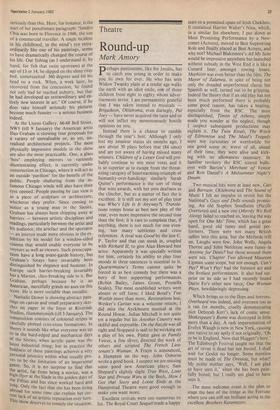Theatre
Round-up
Mark Amory
perhaps pantomime, like the Jesuits, has to catch you young in order to make you its own for ever. He who has seen Widow Twanky plain at a tender age walks the earth with an idiot smile, one of those children from eight to eighty whom adver- tisements invite. I am permanently grateful that I was taken instead to musicals — Brigadoon, Oklahoma, even daringly, Pal Joey — have never acquired the taste and so will not inflict my monotonously hostile opinions on you.
Instead there .is a chance to ramble through the year's best. Although I only lost my amateur status six months ago, I saw about 30 plays before that (84 since) and am not aware of having missed many winners. Children of a Lesser God will pro- bably continue to win most votes and it is so superior as to escape from the threat- ening category of heartwarming-triumph-of humanity-over-handicap; similarly Sarah Quinn's performance is the sort of thing that wins awards, with her own deafness as the clincher, but as a matter of fact she is excellent. It is still not my sort of play (nor was Who's Life Is It Anyway?). Transla- tions romps home as best new play of the year, even more impressive the second time than the first; it is rare to complain that, if anything, there is too much for one even- ing, too many subtleties and cross references. A rival was Good by the late C. P. Taylor and that can sneak in, coupled with Richard II, to give Alan Howard best actor. Apparently it was specially written for him, certainly his ability to play four moods in three sentences is essential to it. Quartermaine's Terms cannot quite be forced in as best comedy but there was a bevy of best supporting performances (Robin Bailey, James Grout, Prunella Scales). The most established writers were absent or off form: I liked Bond's Two Worlds more than most, Restorations less; Wesker's Caritas was a welcome return; I did miss the Ayckbourn musical at the Round House. Julian Mitchell is not quite yet a regular but his Another Country was skilful and enjoyable. On the Razzle was all right and Stoppard is said to be working on a play of his own. Pinter gave us Family Voices, a fine sliver, directed the work of others and scripted The French Lieu- tenant's Woman. A Frayn is announced, a Hampton on the way. John Osborne wrote a good book. I suspect we are missing some good new American plays; Sam Shepard's slightly slight True West, Lone Star and Private Wars at the Bush, How I Got that Story and Loose Ends at the Hampstead Theatre were good enough to make you want more.
Excellent revivals were too numerous to list. The Royal Court Seagull made a happy start to a promised spate of Irish Chekhov. It contained Harriet Walter's Nina, which, in a similar list elsewhere, I put down as Most Promising Performance by a New- comer (Actress), moved to Best Supporting Role and finally placed as Best Actress, and why not? Michael Blakemore's All My Sons would be impressive anywhere but launched without subsidy in the West End it is like a Cunard liner amongst rowing boats. Mephisto was even better than the film; The Mayor of Zalamea, in spite of being not only the dreaded unperformed classic but Spanish as well, turned out to be gripping. Indeed the theory that if an old play has not been much performed there is probably some good reason, has taken a beating, especially from the RSC. The most distinguished, Timon of Athens, simply made you wonder at the neglect, though I suspect subsequent productions may explain it. The Twin Rivals, The Witch of Edmonton and The Maid's Tragedy were not curiosities or worthwhile for one good scene or, worst of all, ahead of their time, they were alive and kick- ing with no allowances necessary. In familiar territory the RSC scored bulls- eyes with Barton's Merchant of Venice and Ron Daniel's A Midsummer Night's Dream.
Two musical hits were at least new, Cats and Barnum. Oklahoma and The Sound of Music I felt no impulse to revisit but the National's Guys and Dolls sounds promis- ing. An old Stephen Sondheim (Pacific Overtures) and a new one (Merrily We Roll Along) failed to reached us, leaving the way open for One Mo' Time, which has a great band, good old tunes and genial per- formers. There were not many British sallies into this area, but the Mitfords trill on. Laughs were few. John Wells, Angela Thorne and John Nettleton were funny in Anyone for Denis? but those around them were not. Chapter Two allowed Maureen Lipman some scope, but not enough. Can't Pay? Won't Pay! had the funniest act and the liveliest performances. It also had sur- prise on its side as I had recently found Dario Fo's other new farce, One Woman Plays, bewilderingly depressing.
Which brings us to the flops and horrors. Overheard was indeed, and overseen too as it ran for months, cruelly demonstrating nice Deborah Kerr's lack of comic sense. 'Shakespeare's Rome was destroyed in little more than a day. A rash impersonation of Evelyn Waugh is now in New York, causing one native to say aptly if not originally, 'Oh to be in England, Now that Huggett's here.' The Edinburgh Festival taught me that the art of revue is dead but not buried. I shall wait for Godot no longer. Some mention must be made of The Oresteia, but what? My polite mother says, 'Well, I am glad to have seen it,' when she has been pain- fully bored; but I really am glad to have seen it.
The most welcome event is the plan to stage the best of the fringe at the Fortune where you can still see brilliant acting in the excellent Brothers Karamazov.


































 Previous page
Previous page